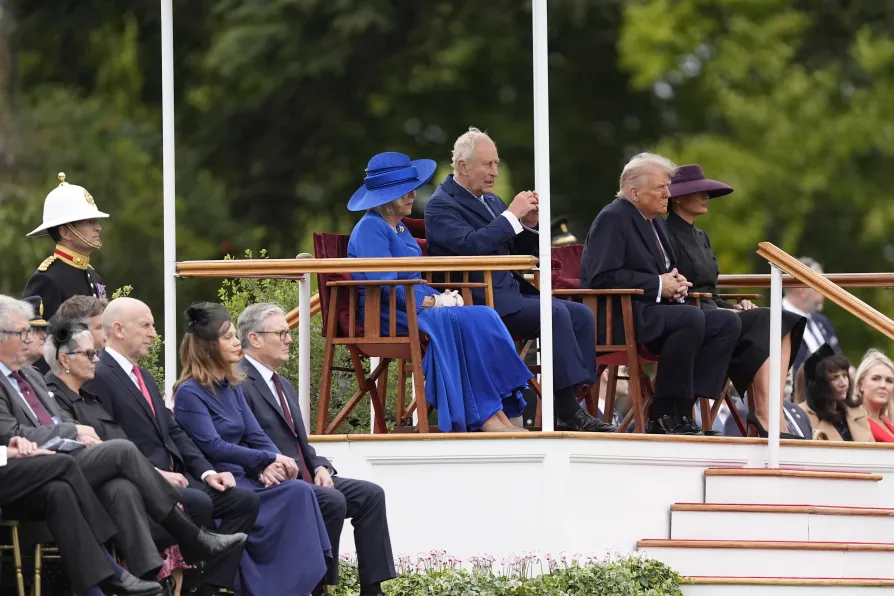Error message
An error occurred while searching, try again later.
 Prime Minister Keir Starmer, Queen Camilla, King Charles III, US President Donald Trump and First Lady Melania Trump during a Beating Retreat military ceremony at Windsor Castle, Berkshire, September 17, 2025
Prime Minister Keir Starmer, Queen Camilla, King Charles III, US President Donald Trump and First Lady Melania Trump during a Beating Retreat military ceremony at Windsor Castle, Berkshire, September 17, 2025
PETER MANDELSON has been recalled to London. Given his fascination for conspicuous wealth, he might well have cadged a lift home in the presidential jet where he and Donald Trump could have bonded over recollections of their long association with the conveniently dead Jeffrey Epstein.
Perhaps not. Even a PR operation as tone deaf to British sensibilities as Trump’s might find this difficult to spin.
We must grin and bear a humiliating exhibition of sycophancy by a Prime Minister who is held in contempt as much by his own citizens as he is by his guest.
From this meeting, the protagonists expect different things. As the self-anointed chief warmonger of a European capitalist alliance that is already divided on economic and political issues, Keir Starmer wants Trump to revive the kind of all-enveloping US commitment to cold war military confrontation with Russia that characterised the Bill Clinton, Barack Obama and Joe Biden regimes.
This was between the two antagonistic systems before actually existing Soviet and European socialism ceased to exist in state form.
The contemporary form in which the conflicted state interests of today’s capitalist Russia and European capitalism are expressed is the proxy war carried out on the borders of Russia by a Nato, within which, since Trump’s second election, US capital has shifted its strategic reasoning.
The official presentation of the talks taking place over these days naturally includes US and British trade relations, in which Starmer has already conceded much in the expectation that Britain is to get off with tariffs less onerous than those imposed on the EU states and just about everyone else.
There is much guff about schemes for technological co-operation and a deal on nuclear power. The most likely outcome of any such agreements will deepen the interpenetration of US and British capital on terms which are more likely to disadvantage the economic interests of the British people as opposed to British capital.
The reality is that European capitalism is caught in a contradiction. In as far as its economic interests centre on a strong and advanced manufacturing sector, it has been greatly disadvantaged by the self-mutilation of its energy sector by sanctions on Russia and the sabotage of the energy transit infrastructure that gave European, principally German, manufacturing a cheap and reliable energy supply.
The EU is divided on energy policy. Slovakia, Hungary and Nato member Turkey cannot easily agree to further sanctions on their main energy supplier, and these disagreements feed into the response of European states to Trump’s strategic objective in leveraging European hostility to better economic and political relations with China.
Russian energy has been replaced by imported and expensive fracked US gas, which is supplied to US manufacturing at a discount that disadvantaged European manufacturers even before Trump’s tariffs are factored in.
Starmer’s negotiating strategy appears to be based on the hope that the hopelessly self-regarding and narcissistic US president might be so dazzled by the wit and charm of King Charles and his consort that he would abandon his notoriously transactional negotiating stance and sign up to the British government’s confrontation with Russia and its hostile policy towards China.
What is distinctive about the Starmer approach is just how contrary it is to the interests of the British people, which naturally lie in trade with the vast markets of Russia, China and the global South and a negotiated peace in Ukraine.
Already, Russia has reoriented its energy strategy towards supplying the dynamic new Eurasian economic axis that China is sponsoring.
The so-called “special relationship” with the US, however it is reconfigured, runs against the interests of working people on both sides of the Atlantic.










